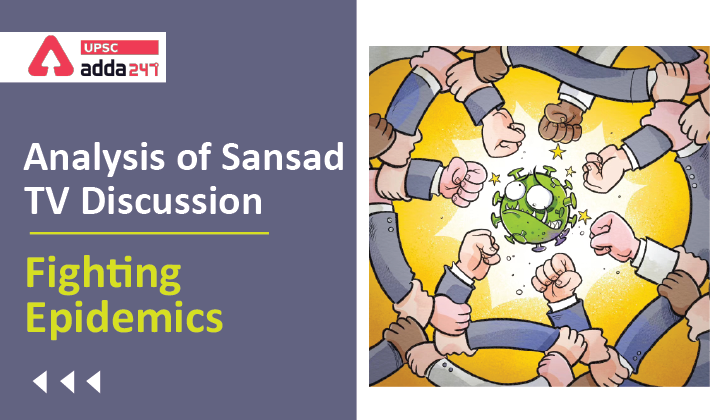Table of Contents
Context
27th December marks the second International Day of Epidemic Preparedness. It was on this day in 2020 that the United Nations General Assembly advocated the importance of the prevention of, preparation for and partnership against epidemics, calling on member states to observe the day through education and increasing awareness on epidemics at the local, national, regional and global levels as effective measures to prevent and respond to epidemics.
Background
- According to the global health body WHO, the day marks the significance of preventing, preparing for and partnering against epidemics.
- To commemorate International Day of Epidemic Preparedness this year, UN Secretary-General Antonio Guterres said the coronavirus pandemic shows how infectious diseases can sweep across the world, push health systems to the brink and devastate lives and families.
- He said the havoc caused by Covid-19 reflects that the world learnt no lessons from outbreaks like Ebola, Zika, SARS and others.
- Cautioning that the coronavirus pandemic will not be the last one that humanity will face, the UN chief called for immediate, coordinated action by the world to prepare for future health emergencies.
Significance of the International Day of Epidemic Preparedness
- International days and weeks are occasions to educate the public on issues of concern, to mobilize political will and resources to address global problems and to celebrate and reinforce the achievements of humanity.
- Observing the International Day of Epidemic Preparedness annually helps in highlighting the importance of the prevention of, preparedness for and partnership against epidemics.
- It helps in stressing the significance of partnership and solidarity among every individual, community and State, and regional and international organization, in all stages of epidemic management, as well as the importance of considering a gender perspective in this regard.
- An integrated One Health approach fosters the integration of human health, animal health and plant health, as well as environmental and other relevant sectors.
- So, International cooperation and multilateralism play an important role in the response to epidemics particularly at a time when uncertainty has once again grown worldwide over rising cases of Omicron.
Role of UN in tackling epidemics
- The United Nations system, in particular the World Health Organization, plays a pivotal role in coordinating responses to epidemics, in accordance with its mandate, and in supporting national, regional and international efforts to prevent, mitigate and address the impacts of infectious diseases and epidemics in accordance with the goal of advancing the 2030 Agenda.
- For example, the World Health Organization (WHO) is working closely with global experts, governments and partners to rapidly expand scientific knowledge on the new virus, to track the spread and virulence of the virus, and to provide advice to countries and individuals on measures to protect health and prevent the spread of this outbreak.
Why does the world need to prepare for the next one?
- Preparedness for epidemics is important to prevent the healthcare structures across the world from collapsing under the increased burden that usually accompanies epidemics, as also seen in the case of the second wave of COVID-19 in India earlier this year.
- COVID-19 demonstrated how quickly an infectious disease can sweep across the world, push health systems to the brink, and upend daily life.
- COVID-19 is not be the last pandemic humanity will face. As we respond to this health crisis, we need to prepare for the next one.
- This means scaling-up investments in better monitoring, early detection and rapid response plans in every country — especially the most vulnerable, is a must.
How did India respond against recent epidemics?
India’s Preparedness and Response against Zika Virus, COVID-19 pandemic, was quite similar and moved in the following way:
- Conduct surveillance at points of entry into the country, like border crossings, ports and airports to identify people coming from affected countries and suffering from fever or any other symptom of the disease in question.
- Such people are then sent to the nearest health unit.
- Health authorities prepare personnel and Rapid Response teams to undertake surveillance within the community and investigate any outbreak.
- ICMR (Indian Council of Medical Research) and its designated labs test predetermined clinical samples.
- Apart from this, the Union Ministry of Science and Technology’s Department of Biotechnology also supports the implementation of the Ind-CEPI Mission programme on Epidemic preparedness through rapid vaccine development.
What is Ind-CEPI Mission?
- The Ind-CEPI Mission had been approved in March 2019.
- As per the Ind-CEPI MIssion’s Epidemic preparedness through rapid vaccine development guidelines, the mission aims to provide strength to vaccine development for diseases having epidemic potential in India.
- It also looks to coordinate the preparedness for epidemics in the public health system of the country as well as the vaccine industry.
- As per its objectives, the mission aims to support the development of a minimum of two to three new vaccines for potential outbreak threats up to the second phase of testing in a span of five years.
- It also looks to strengthen the infrastructure needed to develop vaccines via an academia-industry interface, while also supporting skill development as well as capacity building.
- According to the Department of Biotechnology, the Ind-CEPI mission has provided financial support to Gennova’s mRNA-based COVID-19 vaccine candidate HGCO19, as well.
- India has been able to delay, if not entirely defy, a third wave of the pandemic with the help of a strong vaccination drive across the country, and with the Ind-CEPI mission, it seems like India is hoping to ensure that such quick vaccine development can be undertaken for any potential epidemic at a later stage as well, which can be a strong point in India’s epidemic preparedness.
Prepare for future epidemics and pandemics
- In the event of the absence of international attention, future epidemics could surpass previous outbreaks in terms of intensity and gravity.
- There is a great need of raising awareness, exchange of information, scientific knowledge and best practices, quality education, and advocacy programmes on epidemics at the local, national, regional and global levels as effective measures to prevent and respond to epidemics.
- There is an urgent need to have resilient and robust health systems, reaching those who are vulnerable or in vulnerable situations.
- It is important to strengthen epidemic prevention by applying lessons learned on epidemic management and how to prevent the stoppage of basic services, and to raise the level of preparedness in order to have the earliest and most adequate response to any epidemic that may arise
Conclusion
An outbreak anywhere is a potential pandemic everywhere. This International Day of Epidemic Preparedness, let’s give this issue the focus, attention and investment it deserves.



 TSPSC Group 1 Question Paper 2024, Downl...
TSPSC Group 1 Question Paper 2024, Downl...
 TSPSC Group 1 Answer key 2024 Out, Downl...
TSPSC Group 1 Answer key 2024 Out, Downl...
 UPSC Prelims 2024 Question Paper, Downlo...
UPSC Prelims 2024 Question Paper, Downlo...





